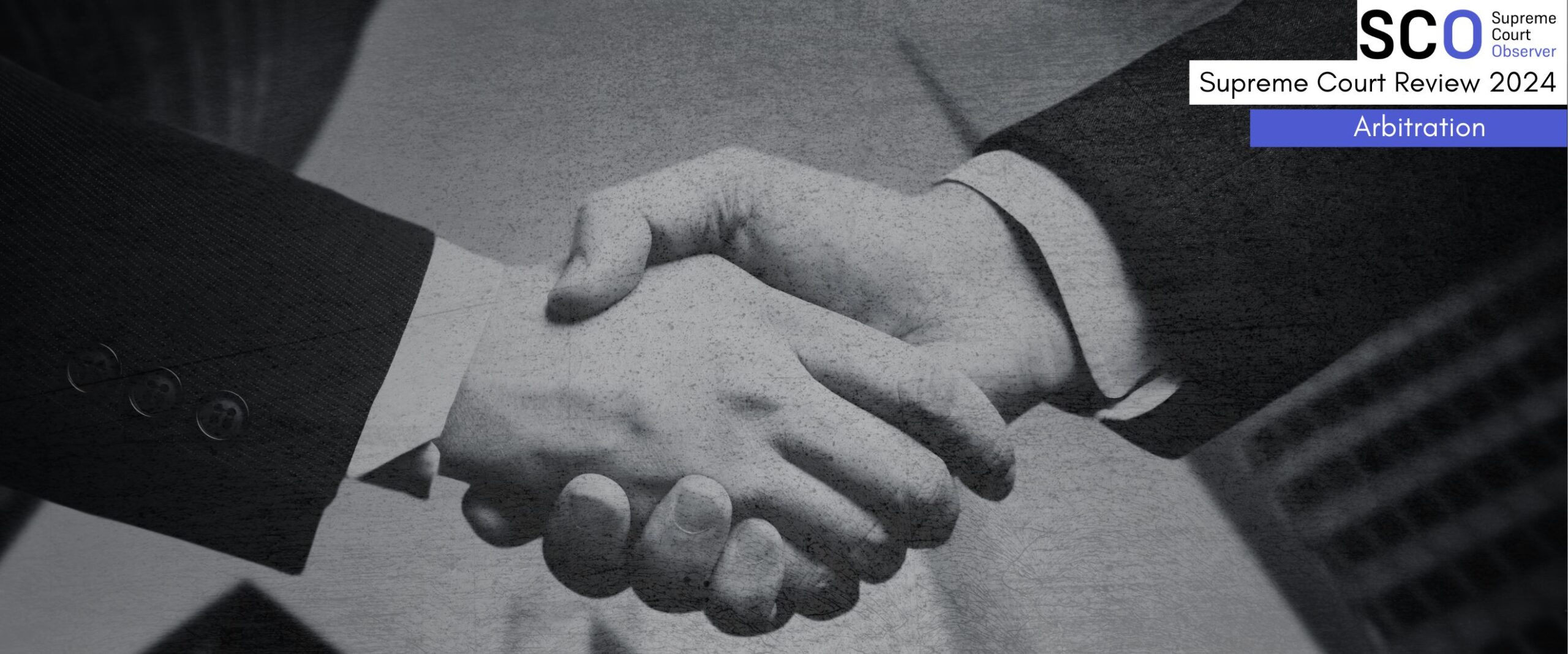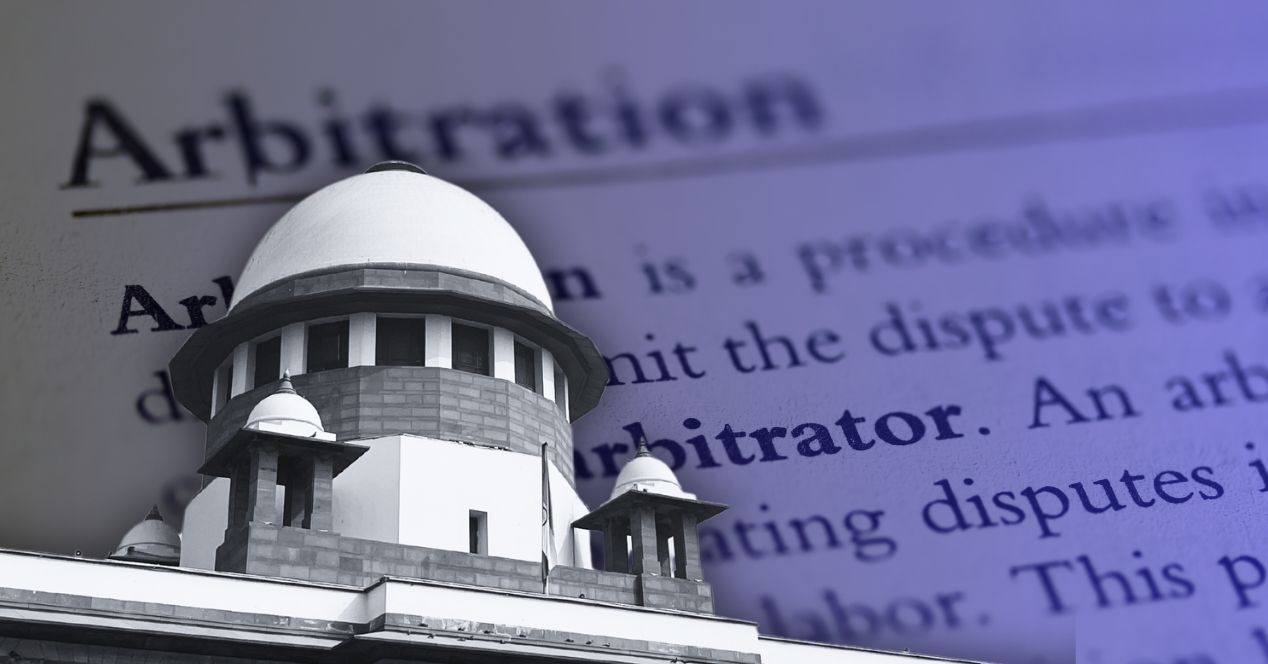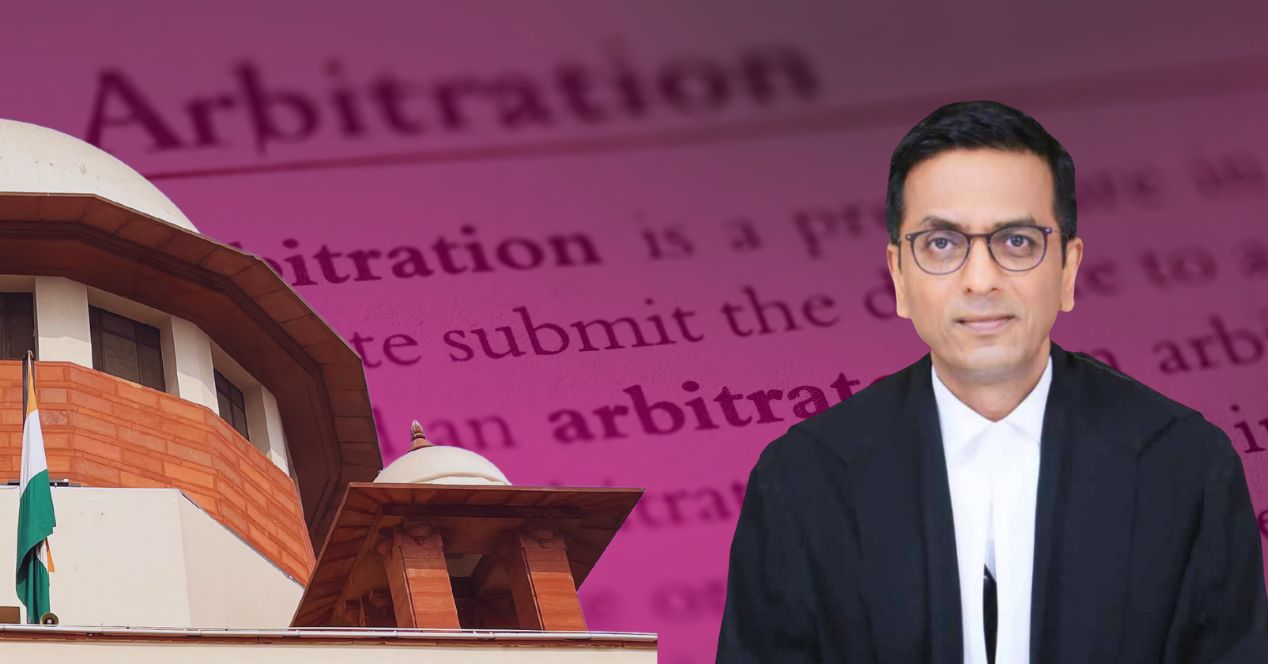Analysis
Supreme Court Review 2024: Mostly friendly towards arbitration
In 2024, the Supreme Court walked the talk on party autonomy, equality and enforceability in arbitration. But there was one blip

Recently, Claudia Salomon, the first woman President of the International Chamber of Commerce’s International Court of Arbitration visited India. While here, she noted that India would first need to be recognised as an “arbitration-friendly” jurisdiction if it has to become a “global arbitration hub”. Referring to the 2021 Survey of International Arbitration conducted by the Queen Mary University of London, she highlighted three key factors for a country to be seen as arbitration-friendly:
- greater support for arbitration by the local courts and judiciary;
- increased neutrality and impartiality of the local legal system; and
- a better track record in enforcing agreements to arbitrate and arbitral awards.
In the last decade, India has been keen to position itself as a global arbitration hub. The Modi Government has spoken about promoting arbitration and other ADR mechanisms. Parliament has amended the Arbitration and Conciliation Act, 1996 several times in attempts to bring the legislation in line with global trends. The 2019 amendments to the Act relaxed the rule prescribing a 12-month timeframe for awards in international commercial arbitration. Most recently, a 2024 amendment bill proposes to further promote institutional arbitration by defining an “arbitral institution” and enhancing its powers.
The judges of the Supreme Court, too, have previously spoken about the steps that need to be taken for India to become an arbitration hub. The Court’s judgements in the last couple of years reflect its appreciation of the factors laid out in the Queen Mary study. In 2023, for instance, Constitution Benches recognised the Group of Companies Doctrine and held that unstamped arbitration agreements were not void.
The message was similarly strong in 2024. Despite a case in which the Court used its curative powers to set aside an arbitral award against a government-owned entity, it would be fair to say that benches had a pro-arbitration stance while ruling on party autonomy, equality and enforceability. In several cases, the Court limited the interference of Indian courts in foreign arbitral awards and encouraged the government to be a more responsible commercial player
Here’s a rundown of the Supreme Court’s key arbitration judgements in 2024.
To set aside or to modify?
Section 34 of the Arbitration Act allows the Court to “set aside” an arbitral award if the party to an arbitration makes an application for the same. But does the power to set aside an award include the power to modify the award?
The Court has deliberated on the issue in several cases. Notably, on 4 January 2024, a bench of Justices A.S. Oka and Sanjay Karol, in S.V. Samudram v State of Karnataka, held that the court could not modify an award because its power under the section was supervisory and not appellate.
The following month, the question was again raised before a three-judge bench in Gayatri Balasamy v ISG Novasoft Technologies Ltd. After noting the conflicting trends on the question, Justices Dipankar Datta, K.V. Viswanathan, and Sandeep Mehta referred the case to a larger bench. Currently, the case is pending adjudication by a five-judge Constitution Bench.
Limitation game
The Limitation Act, 1963, ensures that suits are filed within a specified period to avoid adjudicating old disputes. Section 43 of the Arbitration Act specifies that the Limitation Act also applies to arbitration proceedings.
In Arif Azim Co. Ltd. v Aptech Ltd., a bench of then Chief Justice D.Y. Chandrachud, and Justices J.B. Pardiwala and Manoj Misra held that since Section 11(6) of the Arbitration Act does not prescribe a timeframe for filing, the limitation to file a suit for the appointment of arbitrators was three years according to Article 137 in the Schedule of the Limitation Act. However, the limitation period would commence only after a valid notice invoking arbitration is issued by one party and refused by the other. The Court also recommended that Parliament amend the Arbitration Act to specify a timeframe for filing suits under Section 11(6).
A narrow meaning to ‘public policy’
In Avitel Post Studioz Ltd. v HSBC PI Holdings (Mauritius) Ltd., a bench of Justices Hrishikesh Roy and P.K. Mishra was dealing with an appeal against an arbitral award in favour of HSBC from the Singapore International Arbitration Centre. The appeal by Avitel claimed that the award was contrary to the “public policy of India” and the “most basic notions of morality or justice” under Section 48(2)(b) of the Arbitration Act.
The bench rejected the contention holding that Indian courts followed a “minimal judicial intervention” policy with foreign arbitral awards. The Court also emphasised that India must adhere to international standards of arbitration which accord a narrow meaning to “public policy.” The judges also stated that foreign awards could only be set aside under the “exceptional circumstances” detailed under Section 48.
The curative case of DMRC
In what some commentators consider to be a ‘blip’ in CJI Chandrachud’s progressive arbitration jurisprudence, a bench led by him set aside an award in favour of the Delhi Metro Rail Corporation (DMRC) in a dispute with the Delhi Airport Metro Express Private Limited (DAMEPL), a private company.
The judgement received criticism for the Court’s use of curative powers to undo an arbitral award, which had already been litigated twice in both the Delhi High Court and the Supreme Court. Practitioners pointed out that curative power is an extraordinary remedy used to cure ‘patent illegality’ and by using this route, it breached the principle of finality in arbitral proceedings.
Experts have also pointed out that the Court’s protectionist stance in the case may spook domestic and international parties from doing business with the government. Some practitioners, however, argued that the decision of the Court upheld the principles of natural justice.
Abandonment issue
In Dani Wooltex Corpn. v Sheil Properties (P) Ltd., the Court was dealing with a Bombay High Court order which had set aside the decision of an arbitral tribunal to remove Sheil from the proceedings as it had not participated for two years.
Upholding the High Court’s decision, a bench of Justices Oka and Pankaj Mithal held that the mere absence of a party in arbitration proceedings did not establish that the proceedings were abandoned.
The Court held that the tribunal could terminate proceedings under Section 32 of the Act only if it recorded its satisfaction that continuing the proceedings had become unnecessary or impossible. The Court noted that “the abandonment cannot be readily inferred. There is an implied abandonment when admitted or proved facts are so clinching that the only inference which can be drawn is of the abandonment.”
Remand notice
In Bombay Slum Redevelopment Corpn. (P) Ltd. v Samir Narain Bhojwani, the Court was deciding on a civil appeal. A single-judge bench of the Bombay High Court had set aside an award under Section 34 of the Act, citing “patent illegality”. Upon appeal, a Division Bench of the High Court remanded the proceedings to the single judge for fresh consideration. The question before the top court was if an appellate bench could remand the proceedings to the smaller bench under Section 37 of the Act on the ground that it did not consider certain issues.
A bench of Justices Oka and Mithal held that the appellate court’s powers under Section 37 were far narrower than Section 34. Under Section 37, the Court could remand proceedings only under exceptional circumstances like when the case is summarily disposed under Section 34 without proper consideration of merits or the award is interfered with without service of notice to a respondent.
In the present case, the Court reasoned that the single judge had “elaborately dealt with the merits of the challenge in the Section 34 petition.” The bench said if the Supreme Court did something which was required to be done by the Section 37 court (the Division Bench of the High Court in this case), the unsuccessful party “will be deprived of one forum of challenge.” In the circumstances, it directed the Division Bench to rehear the appeal.
The bench also emphasised that “the supervisory role of the Courts is very restricted” in arbitration proceedings and that the process must be cost-effective and conclude expeditiously.
The age-old seat and venue conundrum
In Arif Azim Co. Ltd. v Micromax Informatics FZE, the Court was dealing with a situation where the contract stipulated that: (a) the “venue” for arbitration would be Dubai; (b) the law applicable to the contract would be UAE law; (c) that the arbitration shall be subject to the UAE Arbitration and Conciliation Rules. The petitioner is a company based in Afghanistan and the respondent is a UAE-incorporated subsidiary of Micromax Informatics Ltd, an Indian company.
There were two questions before the Court: (a) could it intervene and appoint arbitrators when the agreement specified that the venue of arbitration would be Dubai and not the seat; (b) could it assert concurrent jurisdiction when the agreement specifies governance by UAE law.
A bench of then Chief Justice Chandrachud and Justices Pardiwala and Misra clarified that Indian law could be applicable only if the Indian arbitration law applied to the case or if the seat of arbitration was India. However, in the present case, the seat of arbitration was Dubai and UAE law applied as per the agreement. In concluding that Dubai was the seat of arbitration, the Court relied on the three-prong test laid out in BGS SGS SOMA JV v NHPC Ltd:
- The arbitration agreement must name a single place
- The proceedings must be fixed there with no flexibility; and
- The agreement must not contain anything else to indicate that the designated location is not the seat.
The Court also clarified that the ‘closest connection test’ was no longer viable in determining the seat of arbitration.
No distinction between private and government entities
In October 2024, a Division Bench led by former Chief Justice Chandrachud in International Seaport Dredging v Kamarajar Port Ltd. held there must be no distinction between private and government entities while applying provisions of the Arbitration Act, which is a “self-contained code”.
On Chief Justice Chandrachud’s final working day, in CORE v ECL-SPIC-SMO-MCML (JV), the only Constitution Bench decision concerning the Arbitration Act last year, a five-judge bench led by him held that the clauses allowing unilateral appointments to arbitral tribunals were invalid. Unilateral clauses, the Court held, violated the principle of equality and equal treatment of parties enshrined in Section 18 of the Arbitration Act. The bench also clarified that the arbitration process commenced at the stage of appointing arbitrators and therefore parties had to be treated equally from that stage.
The bench, however, was split on the reasoning. The majority led by Chief Justice Chandrachud stated that the unilateral appointment of arbitrators violated the principle of equality under Article 14 of the Constitution. In their partial dissent, Justices Roy and P.S. Narasimha cautioned against applying principles of public law to matters of private law.
Practitioners have commented that the judgement encourages parity between parties and encourages the government to be a more responsible commercial player.
Favouring enforceability
A partnership deed between parties had an “optional” arbitration clause and stated that the arbitrator would be selected through mutual consent. The question before a bench of Justices Sajiv Khanna and Sanjay Kumar in Tarun Dhameja v Sunil Dhameja was whether the “optional” clause could be invoked and enforced.
Batting in favour of the arbitration clause, the bench held that the “option” did not mean that the “arbitration clause is optional in the sense that the arbitration clause is nonexistent or that the matter would be referred to arbitration only if all the parties to the dispute agree to refer the dispute to arbitration.” Rather, it meant that either party had the option to initiate arbitration proceedings. The mutual consent was to select the arbitrator and not to refer the matter to arbitration.
The bench referred to the judgement in Vidya Drolia v Durga Trading Corp. (2020), where the Court had noted that in “pure commercial disputes”, the “more appropriate principle of interpretation” of an arbitration agreement “would be the one of liberal construction as there is a presumption in favour of one-stop adjudication.”








